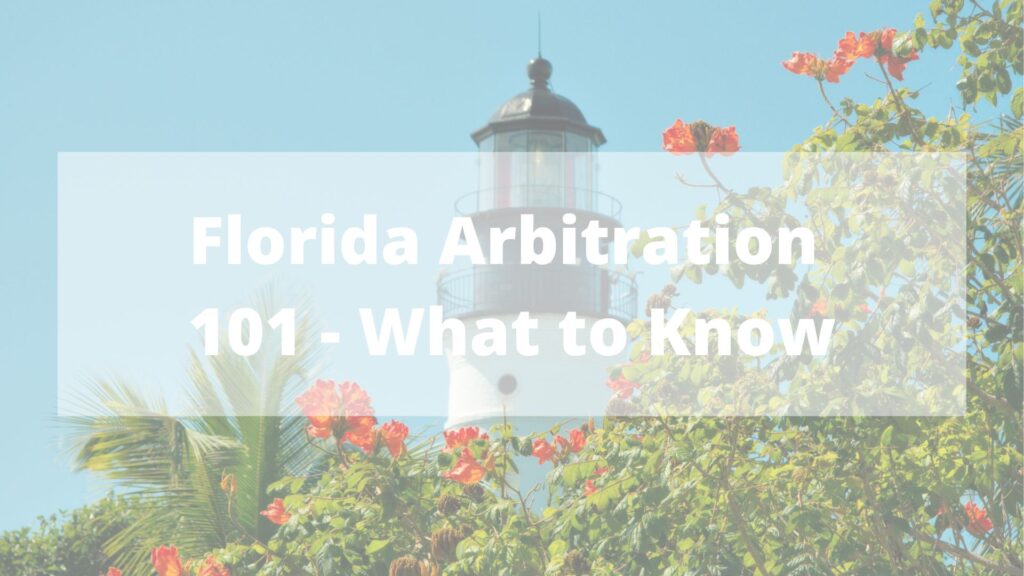
As most of us already know, briefly stating, arbitration is a private, out-of-court process by which all parties agree, in writing, to submit their dispute to one or more impartial persons authorized to resolve the controversy by rendering a final and binding award. What makes this process unique is the ability, with some advance consideration, to customize and tailor the dispute resolution process to suit the needs of the company or person. However, this article is shaped to reflect the qualifications your arbitrator should possess in the state of Florida, such as their training, and general standards, as well as the arbitration process, potential fees, expenses, and communication guidelines. To learn more about Arbitration services, please click here.
If we reflect on the Florida Rules for Court–Appointed Arbitrators from the ADR Resource Handbook, we’re aware that the qualifications for a Chief Arbitrator shall have been a member of the Florida Bar for at least five years. However, Arbitrators who are not part of the Florida Bar may serve only as arbitration panel members, with written agreement from all parties involved.
Training for all Arbitrators are expected to attend four hours of training, which has been approved by the Supreme Court of Florida. However, former Florida trial judges may be exempt from the required training upon submission of experience documents, which would be handed to the Chief Judge. When it comes to General Standards, arbitrators must not accept engagement, perform services, or undertake any acts that comprise the integrity of the arbitrator, must maintain professional competence, must abide by the statutes, rules, and orders of the Florida Legal Statues, and must regularly engage in educational activities and training that promote professional growth.
When it comes to Fees and Expenses, an arbitrator of Florida law must keep charges for services and their associated expenses reasonable and consistent with the nature of the case. In the State of Florida, in accordance with Florida Statute Section 44.103(3), an arbitrator may not charge more than $1,500.00 per diem – unless all parties agree otherwise. However, there are certain situations where Advocacy and Pro Bono services come into play. Arbitrators and Mediators have the responsibility to help the person(s) who are seeking assistance. This includes those who are unable to pay for their services. When appropriate, arbitrators and their mediation services should be considered as pro bono, or set at a reduced rate whenever necessary.
As a process intended to be less formal than litigation, the entire case preparation and information exchange can be streamlined, saving both counsel and clients time and resources. Further, it is often possible to have an entire dispute brought before the arbitrator in a one-day hearing and possibly without the need for court reporters and fees. This is an achievement not often found in litigation. There is, however, some debate in the field whether arbitration is less costly than litigation. Arbitration for larger and more complex claims may not produce the cost savings found in less complicated claims.
Where properly stated and agreed to in writing, the arbitrator may be free to award the reimbursement of all fees and costs associated with bringing forth the claim to either party, including all filing and attorney’s fees. This is an example of how some advance planning and consideration with your attorney can make a future claim more to your business’s or individual advantage.
Resources:
Florida rules for Certified & Court-appointed mediators, , https://www.flcourts.gov/content/download/216759/file/rules-certified-court-appointed-mediators.pdf (last visited Jan 17, 2023).
The 2022 Florida Statutes (including Special Session A), Statutes & constitution : view statutes : Online sunshine (2023), http://www.leg.state.fl.us/statutes/index.cfm?App_mode=Display_Statute&URL=0000-0099%2F0044%2FSections%2F0044.103.html (last visited Jan 17, 2023).
 The author, John Caravella Esq., is a construction attorney and formerly practicing project architect at The Law Office of John Caravella, P.C., representing architects, engineers, contractors, subcontractors, and owners in all phases of contract preparation, litigation, and arbitration across New York and Florida. He also serves as an arbitrator to the American Arbitration Association Construction Industry Panel. Mr. Caravella can be reached by email: [email protected] or (631) 608-1346.
The author, John Caravella Esq., is a construction attorney and formerly practicing project architect at The Law Office of John Caravella, P.C., representing architects, engineers, contractors, subcontractors, and owners in all phases of contract preparation, litigation, and arbitration across New York and Florida. He also serves as an arbitrator to the American Arbitration Association Construction Industry Panel. Mr. Caravella can be reached by email: [email protected] or (631) 608-1346.
The information provided on this website does not, and is not intended to, constitute legal advice; instead, all information, content, and materials available on this site are for general informational purposes only. Readers of this website should contact their attorney to obtain advice with respect to any particular legal matter. No reader, user, or browser of this site should act or refrain from acting on the basis of information on this site without first seeking legal advice from counsel in the relevant jurisdiction. Only your individual attorney can provide assurances that the information contained herein – and your interpretation of it – is applicable or appropriate to your particular situation. Use of, and access to, this website or any of the links or resources contained within the site do not create an attorney-client relationship between the reader, user, or browser and website authors, contributors, contributing law firms, or committee members and their respective employers.
